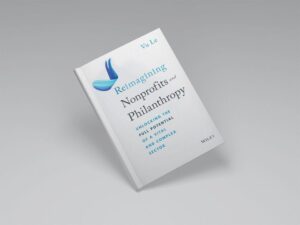November 7, 2016; The Boston Globe
Dan Pallotta’s words have bounce, and he has a diamond-cutter’s eye for what glitters. His message is to the nonprofit world what Protestant “prosperity theology” is to Christianity. Both have come under the watchful eye of Senator Chuck Grassley. Grassley questioned the Wounded Warrior Project about its significant investment in Pallotta’s Charity Defense Council, and he scrutinized a host of televangelists for any sign that their nonprofit ministries enriched anyone but themselves.
In announcing Pallotta’s upcoming “Bolder Board Training” workshop this weekend in Cambridge, the Boston Globe notes Pallotta’s credentials, namely the AIDS Rides and the Breast Cancer 3-Day walks, and the Charity Defense Council. Thankfully, no mention was made of his “dead-wrong” 2013 TED Talk that summarized and harshly judged hundreds of years of philanthropy in just under 19 minutes.
Is Pallotta qualified to speak to what makes for effective boards of directors or even charities with a pulse?
Let’s consider the bike rides and the walks. Pallotta did not invent them. The largest and one of the oldest athletic charity events in the country, founded in 1980, is the Pan-Mass Challenge for the benefit of The Jimmy Fund. Pallotta’s for-profit event planning company’s innovation was to add a few days to the concept and hike the participation fee. By Pallotta’s own account, the venture ended badly.
On the day we were closing our doors, employees were coming up to me asking if they could start their own event businesses, ripping away what they could from the carcass of the company before the body was cold.
Let’s consider the Charity Defense Council. Three board members, one of which is Pallotta. The ruling year was 2012. What has this “bolder” board achieved in the past four years? Its latest Form 990, available at GuideStar, shows for fiscal year ending 12/31/2014 that the revenue was $175,273. Not a lot going on at the charity’s website blog, Facebook, or Twitter these days. Where is the nonprofit’s 2015 Form 990? Given the outsized grant from the Wounded Warrior Project, one has to wonder whether the Charity Defense Council would meet the IRS Public Charity Support Test, let alone changing the world for the better.
Sign up for our free newsletters
Subscribe to NPQ's newsletters to have our top stories delivered directly to your inbox.
By signing up, you agree to our privacy policy and terms of use, and to receive messages from NPQ and our partners.
The Boston Globe reports:
“Most of the training board members get, for those who get training at all, is about fiduciary duty and governance and finance,” he says. “They just get plopped there with a bunch of Excel spreadsheets to review cash flow, and that’s it.
“I don’t think most people join a board to review spreadsheets once a month,” Pallotta adds. “I think they really want to make a difference and get involved with an idea that’s pushing the envelope, pushing the limits, pushing them.”
Actually, yes, fiduciary duty and governance and finance are important components of a director’s commitment. No, actually, at least in this writer’s experience, governance is only one among many elements of the experience. Board members are often the chief strategists and fundraisers for the causes they serve. Pallotta might have a better understanding of how boards actually behave if he served on more of them, or even voluntarily gave more of his own time and talent to charity work. A glance at his LinkedIn profile indicates that he is a marketing and advertising expert, his two “Experience” stops being Pallotta TeamWorks (1991–present) and Advertising for Humanity (2011–present).
If you miss his workshop this weekend on board “visioning,” Pallotta is a headliner at the NANOE “Convention & Expo” in March 2017 in Columbia, South Carolina. This is a Jimmy LaRose initiative that like Pallotta is “Reimagining Philanthropy.” LaRose’s book and message include these observations: “money is more important than mission,” “donors are more important than clients or causes,” and, awkwardly at least this weekend for Pallotta, “volunteer boards don’t work and never will.”
Thankfully, the many months of negative political campaigning are coming to a blessed end today. Not so for those who strive to make a living off the nonprofit community with provocative sound bites on the speaking and workshop circuit. Pallotta’s two books are entitled Uncharitable and Charity Case. His TED Talk was entitled, “The way we think about charity is dead wrong.” Really? Everyone, for all time, got philanthropy wrong? A daylong workshop will set everything right by teaching us “vision and boldness?”
Don’t misunderstand: No one will argue that restraint and fear of success are the way to go. Nonprofit work already comprises the bold and the visionary, work that changes how people think and act with one another. But vision and boldness are nothing without humility and an understanding and observation of the ethics of trust, the precious contract at the core of our relationships with donors and stakeholders in general. Its lack of primacy in what we do has created havoc in Pallotta’s wake, but a great salesman may care less about the quality of his product than he does about selling it.—James Schaffer












